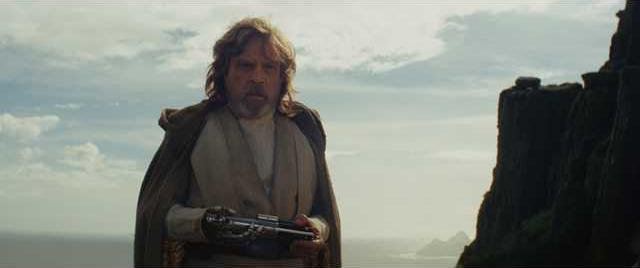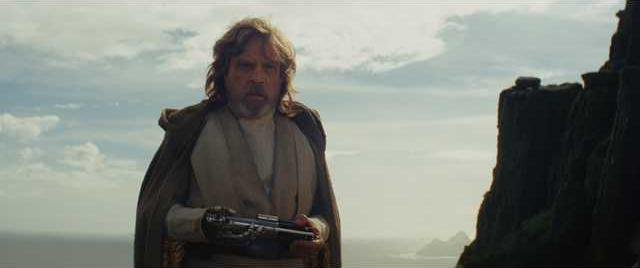Twitter user Jacob Martin just released a new spin on "Star Wars: The Force Awakens" ending.
Many Star Wars fans will remember that the seventh Star Wars film ended with new heroine Rey (Daisy Ridley) meeting Luke Skywalker (Mark Hamill) on a remote island on the planet Ahch-To. She handed Luke his old lightsaber that she retrieved earlier in the film and waited for his reaction, as did the audience before the movie cut to the credits.
Two years later in Star Wars: The Last Jedi, fans saw the aftermath of that scene. Skywalker accepted the lightsaber and then tossed it behind him over a cliff, kicking off the tenuous relationship between Rey and Skywalker.
But what if the two scenes were mixed together and fans didn't have to wait?
Twitter user Jacob Martin spliced the final scene of Force Awakens with the first moment between Skywalker and Rey in The Last Jedi.
The scene, which you can watch below, shows both moments cut together.
Instead of a dramatic switcheroo, wed have two years of fan theories explaining why Luke had to be such a jerk to this person he just met, according to Uproxx.
But the scene is more than just a fan-made cut. It also addresses one of The Last Jedis biggest criticisms.
As Comicbook.com reported, audience members dismissed the scene as merely being nothing more than a cheap physical gag. Screenrant.com listed the scene among the worst moments in the movie.
However, director Rian Johnson told Newsweek that Lukes reaction was the only path for the character.
"I did it because I thought that's what Luke would do," Johnson told Newsweek. "He's made a purposeful choice to walk away from everything, and he's made this Herculean effort to do so. He's taken himself to, as he says, this unfindable place. And then this stranger, a kid, shows up and is a symbol of everything he has left behind."
And Rey, he said, should have expected it.
"She holds (the lightsaber) out to him as if to say, 'Here you go, here's what you've been waiting for.' This is everything he's decided to walk away from! So that seems exactly how he would react to me," Johnson said. "Luke goes, 'What do you expect I'm going to do with this? This is everything I left behind!' Toss, walk off."
If different takes on Last Jedi interest you, you can unlock a special music-only cut of the film which features only composer John Williams score. Read more about it here.
Many Star Wars fans will remember that the seventh Star Wars film ended with new heroine Rey (Daisy Ridley) meeting Luke Skywalker (Mark Hamill) on a remote island on the planet Ahch-To. She handed Luke his old lightsaber that she retrieved earlier in the film and waited for his reaction, as did the audience before the movie cut to the credits.
Two years later in Star Wars: The Last Jedi, fans saw the aftermath of that scene. Skywalker accepted the lightsaber and then tossed it behind him over a cliff, kicking off the tenuous relationship between Rey and Skywalker.
But what if the two scenes were mixed together and fans didn't have to wait?
Twitter user Jacob Martin spliced the final scene of Force Awakens with the first moment between Skywalker and Rey in The Last Jedi.
The scene, which you can watch below, shows both moments cut together.
Instead of a dramatic switcheroo, wed have two years of fan theories explaining why Luke had to be such a jerk to this person he just met, according to Uproxx.
But the scene is more than just a fan-made cut. It also addresses one of The Last Jedis biggest criticisms.
As Comicbook.com reported, audience members dismissed the scene as merely being nothing more than a cheap physical gag. Screenrant.com listed the scene among the worst moments in the movie.
However, director Rian Johnson told Newsweek that Lukes reaction was the only path for the character.
"I did it because I thought that's what Luke would do," Johnson told Newsweek. "He's made a purposeful choice to walk away from everything, and he's made this Herculean effort to do so. He's taken himself to, as he says, this unfindable place. And then this stranger, a kid, shows up and is a symbol of everything he has left behind."
And Rey, he said, should have expected it.
"She holds (the lightsaber) out to him as if to say, 'Here you go, here's what you've been waiting for.' This is everything he's decided to walk away from! So that seems exactly how he would react to me," Johnson said. "Luke goes, 'What do you expect I'm going to do with this? This is everything I left behind!' Toss, walk off."
If different takes on Last Jedi interest you, you can unlock a special music-only cut of the film which features only composer John Williams score. Read more about it here.








